AND
-
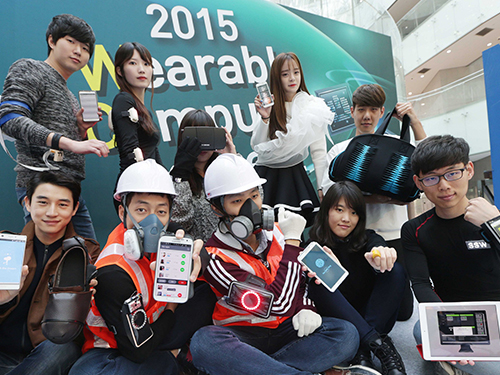 KAIST Hosts the Wearable Computer Contest 2015
“What you see is a compact electronic system on a dust mask, which monitors the amount of dust taken in by a worker and lets other workers know if the person is injured in an industrial site,” said Bum Taek Jung, a Master’s candidate from Sungkyunkwan University during the Wearable Computer Contest 2015 held in KI building of KAIST on November 5, 2015.
He explained his interest in developing this system, “Dust-related respiratory diseases and falling accidents are still prevalent in industrial sites.” He added, “Using the smart dust mask helps monitoring workers’ physical condition in real time, allowing us to cope with accidents in a much more timely manner.” A smart dust mask is a portable device that alerts the user with orange or red light signs when the amount of dust inhaled by the user is higher than the threshold. Its application on a smartphone can also allow project managers to alert the risk of falling accidents to workers by employing a gyroscope and an accelerometer on the mask.
The Wearable Computer Contest 2015 met for the eleventh time at KAIST on November 5-6, 2015. A wearable computer refers to a portable device which users can wear directly on the body or on their clothes while moving. Products that can provide various services by connecting to a smartphone have become increasingly popular. The contest is an excellent opportunity for university students to design creative wearable systems similar to those often depicted in movies and comics.
This year 102 teams from universities all over the nation participated. After screening and evaluation of their presentations, only 8 teams in the product section and 3 teams in the ideas section were selected for the finals. Of the many entries to the contest, the ECG security system caught many people’s attention. The wearable, which attaches to a shirt, acts like an electrocardiogram. By comparing the ECG reading with the one stored in the data server, the wearable can authenticate the user. The system could be widely used by enterprises and financial companies where tight security and authentication are crucial.
The winners of the product and the ideas sections received USD 4,300 and usd 860 respectively along with Minister Prizes from the Minister of Science, ICT and Future Planning of Korea. The Chairman of the contest, Professor Hoi-Jun Yoo from the Electrical Engineering Department of KAIST said, “The contest will be a great opportunity for anyone to have a look at advanced wearable devices developed through close integration of state-of-the-art technologies and creative ideas from young minds.”
2015.11.05 View 8446
KAIST Hosts the Wearable Computer Contest 2015
“What you see is a compact electronic system on a dust mask, which monitors the amount of dust taken in by a worker and lets other workers know if the person is injured in an industrial site,” said Bum Taek Jung, a Master’s candidate from Sungkyunkwan University during the Wearable Computer Contest 2015 held in KI building of KAIST on November 5, 2015.
He explained his interest in developing this system, “Dust-related respiratory diseases and falling accidents are still prevalent in industrial sites.” He added, “Using the smart dust mask helps monitoring workers’ physical condition in real time, allowing us to cope with accidents in a much more timely manner.” A smart dust mask is a portable device that alerts the user with orange or red light signs when the amount of dust inhaled by the user is higher than the threshold. Its application on a smartphone can also allow project managers to alert the risk of falling accidents to workers by employing a gyroscope and an accelerometer on the mask.
The Wearable Computer Contest 2015 met for the eleventh time at KAIST on November 5-6, 2015. A wearable computer refers to a portable device which users can wear directly on the body or on their clothes while moving. Products that can provide various services by connecting to a smartphone have become increasingly popular. The contest is an excellent opportunity for university students to design creative wearable systems similar to those often depicted in movies and comics.
This year 102 teams from universities all over the nation participated. After screening and evaluation of their presentations, only 8 teams in the product section and 3 teams in the ideas section were selected for the finals. Of the many entries to the contest, the ECG security system caught many people’s attention. The wearable, which attaches to a shirt, acts like an electrocardiogram. By comparing the ECG reading with the one stored in the data server, the wearable can authenticate the user. The system could be widely used by enterprises and financial companies where tight security and authentication are crucial.
The winners of the product and the ideas sections received USD 4,300 and usd 860 respectively along with Minister Prizes from the Minister of Science, ICT and Future Planning of Korea. The Chairman of the contest, Professor Hoi-Jun Yoo from the Electrical Engineering Department of KAIST said, “The contest will be a great opportunity for anyone to have a look at advanced wearable devices developed through close integration of state-of-the-art technologies and creative ideas from young minds.”
2015.11.05 View 8446 -
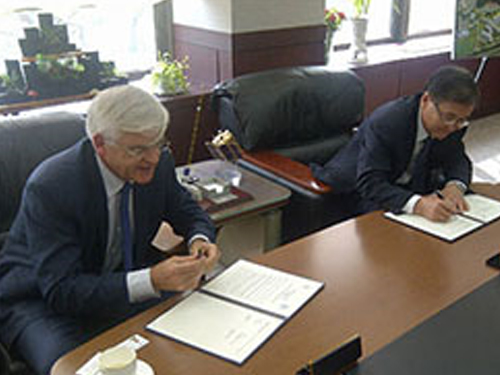 Partnership with École Centrale Paris
Courtesy of École Centrale Paris News: http://www.ecp.fr/lang/en/home/news?actuID=48892
Strengthening of the partnership betwenn CentraleSupélec and KAIST University, South Korea
The two institutions signed a new agreement.
Hervé Biausser (left in the picture), Director of CentraleSupélec, has met Sung-Mo Steve Kang (right in the picture), the President of the Korea Advanced Institute of Science and Technology (KAIST). They signed an agreement aiming to strengthen the partnership between the two institutions concerning research and higher education.
CentraleSupélec and KAIST have cooperated since 2010 on research projects in the context of the Erasmus Mundus BEAM and EASED programs, which are coordinated by CentraleSupélec.
The next step is now the application of graduate academic mobility in the common fields of excellency of the institutions: energy, electronic, physics and mathematics.
2015.11.02 View 5825
Partnership with École Centrale Paris
Courtesy of École Centrale Paris News: http://www.ecp.fr/lang/en/home/news?actuID=48892
Strengthening of the partnership betwenn CentraleSupélec and KAIST University, South Korea
The two institutions signed a new agreement.
Hervé Biausser (left in the picture), Director of CentraleSupélec, has met Sung-Mo Steve Kang (right in the picture), the President of the Korea Advanced Institute of Science and Technology (KAIST). They signed an agreement aiming to strengthen the partnership between the two institutions concerning research and higher education.
CentraleSupélec and KAIST have cooperated since 2010 on research projects in the context of the Erasmus Mundus BEAM and EASED programs, which are coordinated by CentraleSupélec.
The next step is now the application of graduate academic mobility in the common fields of excellency of the institutions: energy, electronic, physics and mathematics.
2015.11.02 View 5825 -
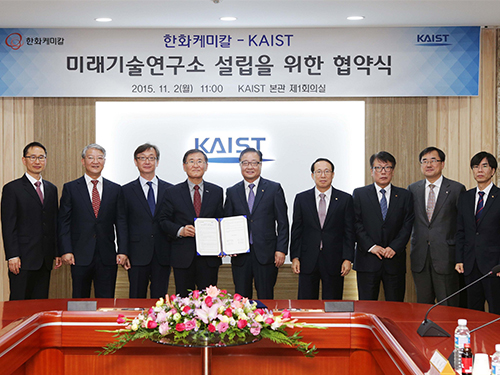 KAIST and Hanwha Chemical Agree on Research Collaboration
KAIST signed a memorandum of understanding (MOU) with Hanwha Chemical Co., Ltd., a Korean chemical and auto manufacturer, on November 2, 2015 to establish a research center on campus.
The research center, which will be named “KAIST-Hanwha Chemical Future Technology Research Center,” will implement joint research projects for five years beginning from 2016 to develop innovative, green technologies that will help the Korean chemical industry boost its global competitiveness and to nurture top researchers and engineers in chemical engineering.
The research center will lead the development of next-generation petrochemical materials and manufacturing technology and the establishment of pure high-refining processes which are more energy-efficient and environmentally friendly. KAIST and Hanwha will strive to secure new technologies that have the greatest commercialization potential in the global market. They will also establish a scholarship fund for 15 KAIST doctoral students in the Department of Chemical and Biomolecular Engineering.
Many professors from the Chemical and Biomolecular Engineering Department including Distinguished Professor Sang Yup Lee, who was listed in the Top 20 Translational Researchers of 2014 by Nature Biotechnology this year, and Professor Hyunjoo Lee who received the Woman Scholar award at the 2015 World Chemistry Conference, will work at the research center.
Professor Lee, the head of the research center, said, “Collaborating with Hanwha will give us a strong basis for our efforts to carry out original research and train the best researchers in the field.”
Chang-Bum Kim, the Chief Executive Officer (CEO) of Hanwha Chemical, said,
“We hope our collaborations with KAIST will go beyond the typical industry and university cooperation. The two organizations will indeed jointly operate the research center, and this will become a new model for industry and university cooperation. We expect that the research center will play a crucial role in the development of new products and technologies to grow the Korean chemical industry.”
In the photo, President Steve Kang of KAIST (fourth from left) and CEO Chang-Bum Kim of Hanwha Chemical (fifth from left) hold the MOU together.
2015.11.01 View 11568
KAIST and Hanwha Chemical Agree on Research Collaboration
KAIST signed a memorandum of understanding (MOU) with Hanwha Chemical Co., Ltd., a Korean chemical and auto manufacturer, on November 2, 2015 to establish a research center on campus.
The research center, which will be named “KAIST-Hanwha Chemical Future Technology Research Center,” will implement joint research projects for five years beginning from 2016 to develop innovative, green technologies that will help the Korean chemical industry boost its global competitiveness and to nurture top researchers and engineers in chemical engineering.
The research center will lead the development of next-generation petrochemical materials and manufacturing technology and the establishment of pure high-refining processes which are more energy-efficient and environmentally friendly. KAIST and Hanwha will strive to secure new technologies that have the greatest commercialization potential in the global market. They will also establish a scholarship fund for 15 KAIST doctoral students in the Department of Chemical and Biomolecular Engineering.
Many professors from the Chemical and Biomolecular Engineering Department including Distinguished Professor Sang Yup Lee, who was listed in the Top 20 Translational Researchers of 2014 by Nature Biotechnology this year, and Professor Hyunjoo Lee who received the Woman Scholar award at the 2015 World Chemistry Conference, will work at the research center.
Professor Lee, the head of the research center, said, “Collaborating with Hanwha will give us a strong basis for our efforts to carry out original research and train the best researchers in the field.”
Chang-Bum Kim, the Chief Executive Officer (CEO) of Hanwha Chemical, said,
“We hope our collaborations with KAIST will go beyond the typical industry and university cooperation. The two organizations will indeed jointly operate the research center, and this will become a new model for industry and university cooperation. We expect that the research center will play a crucial role in the development of new products and technologies to grow the Korean chemical industry.”
In the photo, President Steve Kang of KAIST (fourth from left) and CEO Chang-Bum Kim of Hanwha Chemical (fifth from left) hold the MOU together.
2015.11.01 View 11568 -
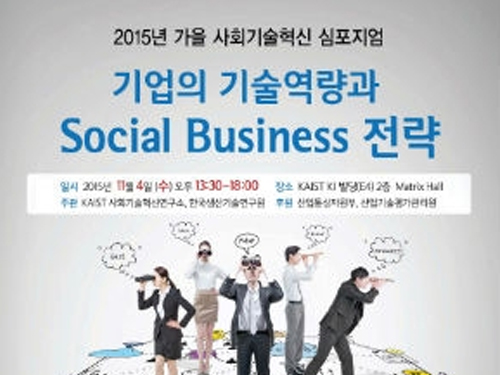 KAIST Invites Entrepreneurs and Experts to Participate in a Social Technology Innovation Symposium
The Research Institute for Social Technology and Innovation (RISTI) at KAIST hosted the Social Technology Innovation Symposium on November 4, 2015 in KI building, to which 100 social business entrepreneurs and experts in the field were invited.
Social businesses refer to activities of companies, which strive to resolve social problems such as environmental issues, income inequality, and aging societies while seeking profit at the same time. This is different from companies taking social responsibility and non-profit organization serving the community in that they attempt to solve social problems through a sustainable business model.
Held under the theme of “technology capabilities of companies and social business strategies,” this symposium was the first to gather representatives from social venture companies, medium-sized enterprises, and major companies at one place to share their experiences in a social business and to discuss future tasks.
The symposium was divided into sessions with three different topics ranging from social business strategies using information technology, a social business and its business model, and social business strategies of major companies.
The symposium started with keynote speeches delivered by Professor HongKyu Lee, RISTI, and Professor Hong-Tak Lim, RISTI, who discussed the role of technology in a social business. It was followed by plenary sessions led by CEOs who are running social businesses such as the Sharing and Technologies Incorporated Project, Simwon Technology, Ecojun Company, Underdogs, and the Farming Fund as well as by representatives from a social responsibility section of CJ management team and the social responsibility council of SK. In the future, these talks will serve as a medium to share their experiences in social businesses and to discuss the role of technology in the business. Some talks touched upon topics such as development of platforms for social innovation, social businesses employing disabled workers, and crowd funding for farming.
The Director of RISTI, Professor HongKyu Lee said, “The symposium will be the first to have people from leading companies in social businesses in Korea in one place.” He added, “This will be a great opportunity for anyone to know what will be the future of social businesses, which were created to solve the social problems caused by capitalism.”
The symposium was sponsored by the Ministry of Trade, Industry, and Energy of Korea.
2015.10.30 View 8864
KAIST Invites Entrepreneurs and Experts to Participate in a Social Technology Innovation Symposium
The Research Institute for Social Technology and Innovation (RISTI) at KAIST hosted the Social Technology Innovation Symposium on November 4, 2015 in KI building, to which 100 social business entrepreneurs and experts in the field were invited.
Social businesses refer to activities of companies, which strive to resolve social problems such as environmental issues, income inequality, and aging societies while seeking profit at the same time. This is different from companies taking social responsibility and non-profit organization serving the community in that they attempt to solve social problems through a sustainable business model.
Held under the theme of “technology capabilities of companies and social business strategies,” this symposium was the first to gather representatives from social venture companies, medium-sized enterprises, and major companies at one place to share their experiences in a social business and to discuss future tasks.
The symposium was divided into sessions with three different topics ranging from social business strategies using information technology, a social business and its business model, and social business strategies of major companies.
The symposium started with keynote speeches delivered by Professor HongKyu Lee, RISTI, and Professor Hong-Tak Lim, RISTI, who discussed the role of technology in a social business. It was followed by plenary sessions led by CEOs who are running social businesses such as the Sharing and Technologies Incorporated Project, Simwon Technology, Ecojun Company, Underdogs, and the Farming Fund as well as by representatives from a social responsibility section of CJ management team and the social responsibility council of SK. In the future, these talks will serve as a medium to share their experiences in social businesses and to discuss the role of technology in the business. Some talks touched upon topics such as development of platforms for social innovation, social businesses employing disabled workers, and crowd funding for farming.
The Director of RISTI, Professor HongKyu Lee said, “The symposium will be the first to have people from leading companies in social businesses in Korea in one place.” He added, “This will be a great opportunity for anyone to know what will be the future of social businesses, which were created to solve the social problems caused by capitalism.”
The symposium was sponsored by the Ministry of Trade, Industry, and Energy of Korea.
2015.10.30 View 8864 -
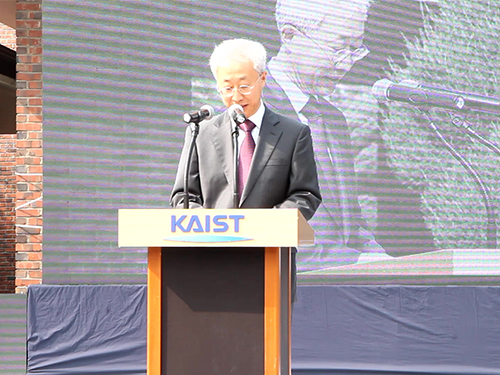 KAIST's Graduate School of Culture Technology Celebrates Its Tenth Anniversary
The Graduate School of Culture Technology (GSCT) at KAIST hosted a ceremony and a variety of events to celebrate its tenth anniversary on October 22, 2015, on campus.
Established in 2005 with the support of the Ministry of Culture, Sports and Tourism of the Republic of Korea, GSCT offers an intensive, in-depth education in culture technology, an interdisciplinary field first introduced in Korea by KAIST, which brings arts, humanities, science, and technology together in an academic and research arena.
Over the years, the graduate school has fostered top-notch researchers and professionals who have played a leading role in the development of a Korean culture contents industry that includes movies, broadcasting programs, music, games, and culture events.
After the anniversary ceremony, GSCT held a "Demo Day" to showcase its major research projects. A total of 41 projects were presented under the themes of “Art and Science,” “Human and Humane,” and “Virtual Reality vs Reality.”
In addition, there was a seminar held on GSTC’s ten-year accomplishment and future planning with the school’s Professors Sunghee Lee, Juyong Park, and Juhan Nam; a cultural event for the public called the “Talk Concert,” which included many professionals in culture industry and academia to share ideas and views; and the Homecoming Day for GSTC graduates. So far, the graduate school has produced 295 masters and 34 doctors. About 34% of its graduates are employed in the movie, game, and broadcasting sectors, 33% in the social networking service and Internet industry, and 33% in performing art and exhibition and event.
Dong-Man Lee, the Dean of KAIST's Graduate School of Culture Technology, said,
“We will continue to develop our school to lead the advancement of the Korean culture industry, contributing to the growth of Korean Wave, the popularity of Korean culture, in the global community.”
In the picture below, Dean Lee delivers a speech to celebrate the school’s tenth anniversary.
Soo-Man Lee, the founding chairman of S.M. Entertainment, speaks at the Talk Concert.
Scenes from the Demo Day
2015.10.26 View 8355
KAIST's Graduate School of Culture Technology Celebrates Its Tenth Anniversary
The Graduate School of Culture Technology (GSCT) at KAIST hosted a ceremony and a variety of events to celebrate its tenth anniversary on October 22, 2015, on campus.
Established in 2005 with the support of the Ministry of Culture, Sports and Tourism of the Republic of Korea, GSCT offers an intensive, in-depth education in culture technology, an interdisciplinary field first introduced in Korea by KAIST, which brings arts, humanities, science, and technology together in an academic and research arena.
Over the years, the graduate school has fostered top-notch researchers and professionals who have played a leading role in the development of a Korean culture contents industry that includes movies, broadcasting programs, music, games, and culture events.
After the anniversary ceremony, GSCT held a "Demo Day" to showcase its major research projects. A total of 41 projects were presented under the themes of “Art and Science,” “Human and Humane,” and “Virtual Reality vs Reality.”
In addition, there was a seminar held on GSTC’s ten-year accomplishment and future planning with the school’s Professors Sunghee Lee, Juyong Park, and Juhan Nam; a cultural event for the public called the “Talk Concert,” which included many professionals in culture industry and academia to share ideas and views; and the Homecoming Day for GSTC graduates. So far, the graduate school has produced 295 masters and 34 doctors. About 34% of its graduates are employed in the movie, game, and broadcasting sectors, 33% in the social networking service and Internet industry, and 33% in performing art and exhibition and event.
Dong-Man Lee, the Dean of KAIST's Graduate School of Culture Technology, said,
“We will continue to develop our school to lead the advancement of the Korean culture industry, contributing to the growth of Korean Wave, the popularity of Korean culture, in the global community.”
In the picture below, Dean Lee delivers a speech to celebrate the school’s tenth anniversary.
Soo-Man Lee, the founding chairman of S.M. Entertainment, speaks at the Talk Concert.
Scenes from the Demo Day
2015.10.26 View 8355 -
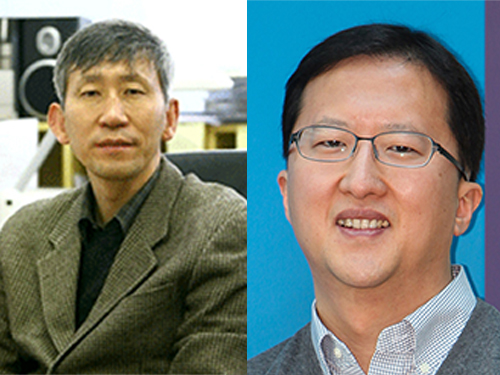 Professors Sukbok Chang and Jang-Wook Choi Receive the 2015 Knowledge Award from the Korean Government
The Ministry of Science, ICT and Future Planning (MISP) of the Republic of Korea announced the 2015 Knowledge Awards on October 20, 2015. Two KAIST professors received the award.
Established in 2009, the awards are presented to Korean scientists whose publications have contributed to the international science community. Specifically, the MISP used the two biggest science databases, Science Citation Index Expanded (SCIE) and Scopus, to identify ten highly cited papers ranked in the top 1% by total citations in the past ten years.
Professor Sukbok Chang of Chemistry (left in the picture below) is a global authority in the field of catalytic hydrocarbon functionalization. His paper entitled “Palladium-catalyzed C-H Functionalization of Pyridine N-Oxides: Highly Selective Alkenylation and Direct Arylation with Unactivated Arenes,” which was published in the Journal of the American Chemical Society in 2008, was once selected by Thomson Reuters as one of the “Most Influential Research Papers of the Month.” In 2011, the American Chemical Society included his paper in the list of the top 20 research papers that were most frequently cited in the last three years.
Professor Jang-Wook Choi of the Graduate School of EEWS (Energy, Environment, Water, and Sustainability) has been known for his leading research in rechargeable battery, supercapacitor, and materials chemistry. In particular, his work on secondary fuel cells attracted significant attention from academia and industry in Korea. Professor Choi developed a super-thin flexible lithium-ion battery this year, thinner than a credit card, which lasts longer than the existing batteries and with greater performance. He also developed new electrode materials for next-generation sodium-ion and magnesium secondary fuel cells.
Professor Sukbok Chang (left) and Professor Jang-Wook Choi (right)
2015.10.23 View 12027
Professors Sukbok Chang and Jang-Wook Choi Receive the 2015 Knowledge Award from the Korean Government
The Ministry of Science, ICT and Future Planning (MISP) of the Republic of Korea announced the 2015 Knowledge Awards on October 20, 2015. Two KAIST professors received the award.
Established in 2009, the awards are presented to Korean scientists whose publications have contributed to the international science community. Specifically, the MISP used the two biggest science databases, Science Citation Index Expanded (SCIE) and Scopus, to identify ten highly cited papers ranked in the top 1% by total citations in the past ten years.
Professor Sukbok Chang of Chemistry (left in the picture below) is a global authority in the field of catalytic hydrocarbon functionalization. His paper entitled “Palladium-catalyzed C-H Functionalization of Pyridine N-Oxides: Highly Selective Alkenylation and Direct Arylation with Unactivated Arenes,” which was published in the Journal of the American Chemical Society in 2008, was once selected by Thomson Reuters as one of the “Most Influential Research Papers of the Month.” In 2011, the American Chemical Society included his paper in the list of the top 20 research papers that were most frequently cited in the last three years.
Professor Jang-Wook Choi of the Graduate School of EEWS (Energy, Environment, Water, and Sustainability) has been known for his leading research in rechargeable battery, supercapacitor, and materials chemistry. In particular, his work on secondary fuel cells attracted significant attention from academia and industry in Korea. Professor Choi developed a super-thin flexible lithium-ion battery this year, thinner than a credit card, which lasts longer than the existing batteries and with greater performance. He also developed new electrode materials for next-generation sodium-ion and magnesium secondary fuel cells.
Professor Sukbok Chang (left) and Professor Jang-Wook Choi (right)
2015.10.23 View 12027 -
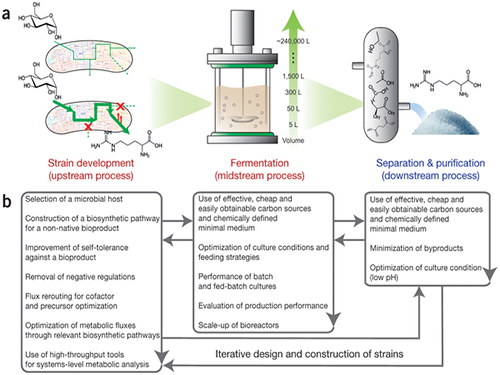 Establishment of System Metabolic Engineering Strategies
Although conventional petrochemical processes have generated chemicals and materials which have been useful to mankind, they have also triggered a variety of environmental problems including climate change and relied too much on nonrenewable natural resources. To ameliorate this, researchers have actively pursued the development of industrial microbial strains around the globe in order to overproduce industrially useful chemicals and materials from microbes using renewable biomass. This discipline is called metabolic engineering.
Thanks to advances in genetic engineering and our knowledge of cellular metabolism, conventional metabolic engineering efforts have succeeded to a certain extent in developing microbial strains that overproduce bioproducts at an industrial level. However, many metabolic engineering projects launched in academic labs do not reach commercial markets due to a failure to fully integrate industrial bioprocesses.
In response to this, Distinguished Professor Sang Yup Lee and Dr. Hyun Uk Kim, both from the Department of Chemical and Biomolecular Engineering at KAIST, have recently suggested ten general strategies of systems metabolic engineering to successfully develop industrial microbial strains. Systems metabolic engineering differs from conventional metabolic engineering by incorporating traditional metabolic engineering approaches along with tools of other fields, such as systems biology, synthetic biology, and molecular evolution.
The ten strategies of systems metabolic engineering have been featured in Nature Biotechnology released online in October 2015, which is entitled "Systems strategies for developing industrial microbial strains."
The strategies cover economic, state-of-the-art biological techniques and traditional bioprocess aspects. Specifically, they consist of: 1) project design including economic evaluation of a target bioproduct; 2) selection of host strains to be used for overproduction of a bioproduct; 3) metabolic pathway reconstruction for bioproducts that are not naturally produced in the selected host strains; 4) increasing tolerance of a host strain against the bioproduct; 5) removing negative regulatory circuits in the microbial host limiting overproduction of a bioproduct; 6) rerouting intracellular fluxes to optimize cofactor and precursor availability necessary for the bioproduct formation; 7) diagnosing and optimizing metabolic fluxes towards product formation; 8) diagnosis and optimization of microbial culture conditions including carbon sources; 9) system-wide gene manipulation to further increase the host strain's production performance using high-throughput genome-scale engineering and computational tools; and 10) scale-up fermentation of the developed strain and diagnosis for the reproducibility of the strain's production performance.
These ten strategies were articulated with successful examples of the production of L-arginine using Corynebacterium glutamicum, 1,4-butanediol using Escherichia coli, and L-lysine and bio-nylon using C. glutamicum.
Professor Sang Yup Lee said, "At the moment, the chance of commercializing microbial strains developed in academic labs is very low. The strategies of systems metabolic engineering outlined in this analysis can serve as guidelines when developing industrial microbial strains. We hope that these strategies contribute to improving opportunities to commercialize microbial strains developed in academic labs with drastically reduced costs and efforts, and that a large fraction of petroleum-based processes will be replaced with sustainable bioprocesses."
Lee S. Y. & Kim, H. U. Systems Strategies for Developing Industrial Microbial Strains. Nature Biotechnology (2015).
This work was supported by the Technology Development Program to Solve Climate Change on Systems Metabolic Engineering for Biorefineries (NRF-2012M1A2A2026556) and by the Intelligent Synthetic Biology Center through the Global Frontier Project (2011-0031963) from the Ministry of Science, ICT and Future Planning (MSIP), Korea, and through the National Research Foundation (NRF) of Korea. This work was also supported by the Novo Nordisk Foundation.
Picture: Concept of the Systems Metabolic Engineering Framework
(a) Three major bioprocess stages (b) Considerations in systems metabolic engineering to optimize the whole bioprocess. List of considerations for the strain development and fermentation contribute to improving microbial strain's production performance (red), whereas those for the separation and purification help in reducing overall operation costs by facilitating the downstream process (blue). Some of the considerations can be repeated in the course of systems metabolic engineering.
2015.10.19 View 10946
Establishment of System Metabolic Engineering Strategies
Although conventional petrochemical processes have generated chemicals and materials which have been useful to mankind, they have also triggered a variety of environmental problems including climate change and relied too much on nonrenewable natural resources. To ameliorate this, researchers have actively pursued the development of industrial microbial strains around the globe in order to overproduce industrially useful chemicals and materials from microbes using renewable biomass. This discipline is called metabolic engineering.
Thanks to advances in genetic engineering and our knowledge of cellular metabolism, conventional metabolic engineering efforts have succeeded to a certain extent in developing microbial strains that overproduce bioproducts at an industrial level. However, many metabolic engineering projects launched in academic labs do not reach commercial markets due to a failure to fully integrate industrial bioprocesses.
In response to this, Distinguished Professor Sang Yup Lee and Dr. Hyun Uk Kim, both from the Department of Chemical and Biomolecular Engineering at KAIST, have recently suggested ten general strategies of systems metabolic engineering to successfully develop industrial microbial strains. Systems metabolic engineering differs from conventional metabolic engineering by incorporating traditional metabolic engineering approaches along with tools of other fields, such as systems biology, synthetic biology, and molecular evolution.
The ten strategies of systems metabolic engineering have been featured in Nature Biotechnology released online in October 2015, which is entitled "Systems strategies for developing industrial microbial strains."
The strategies cover economic, state-of-the-art biological techniques and traditional bioprocess aspects. Specifically, they consist of: 1) project design including economic evaluation of a target bioproduct; 2) selection of host strains to be used for overproduction of a bioproduct; 3) metabolic pathway reconstruction for bioproducts that are not naturally produced in the selected host strains; 4) increasing tolerance of a host strain against the bioproduct; 5) removing negative regulatory circuits in the microbial host limiting overproduction of a bioproduct; 6) rerouting intracellular fluxes to optimize cofactor and precursor availability necessary for the bioproduct formation; 7) diagnosing and optimizing metabolic fluxes towards product formation; 8) diagnosis and optimization of microbial culture conditions including carbon sources; 9) system-wide gene manipulation to further increase the host strain's production performance using high-throughput genome-scale engineering and computational tools; and 10) scale-up fermentation of the developed strain and diagnosis for the reproducibility of the strain's production performance.
These ten strategies were articulated with successful examples of the production of L-arginine using Corynebacterium glutamicum, 1,4-butanediol using Escherichia coli, and L-lysine and bio-nylon using C. glutamicum.
Professor Sang Yup Lee said, "At the moment, the chance of commercializing microbial strains developed in academic labs is very low. The strategies of systems metabolic engineering outlined in this analysis can serve as guidelines when developing industrial microbial strains. We hope that these strategies contribute to improving opportunities to commercialize microbial strains developed in academic labs with drastically reduced costs and efforts, and that a large fraction of petroleum-based processes will be replaced with sustainable bioprocesses."
Lee S. Y. & Kim, H. U. Systems Strategies for Developing Industrial Microbial Strains. Nature Biotechnology (2015).
This work was supported by the Technology Development Program to Solve Climate Change on Systems Metabolic Engineering for Biorefineries (NRF-2012M1A2A2026556) and by the Intelligent Synthetic Biology Center through the Global Frontier Project (2011-0031963) from the Ministry of Science, ICT and Future Planning (MSIP), Korea, and through the National Research Foundation (NRF) of Korea. This work was also supported by the Novo Nordisk Foundation.
Picture: Concept of the Systems Metabolic Engineering Framework
(a) Three major bioprocess stages (b) Considerations in systems metabolic engineering to optimize the whole bioprocess. List of considerations for the strain development and fermentation contribute to improving microbial strain's production performance (red), whereas those for the separation and purification help in reducing overall operation costs by facilitating the downstream process (blue). Some of the considerations can be repeated in the course of systems metabolic engineering.
2015.10.19 View 10946 -
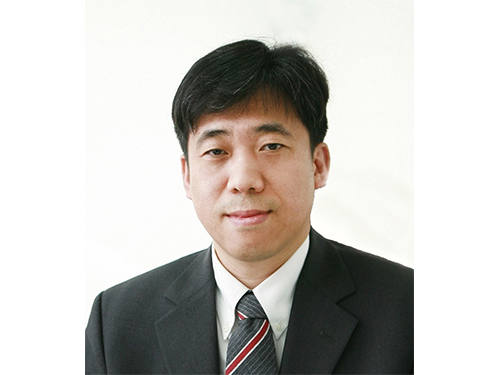 Professor Ki-Jun Jeong Wins the 2015 Dam Yeun Academic Award
The 11th Dam Yeun Academic Award presented by the Korean Society for Biotechnology and Bioengineering (KSBB) to a biologist under 45 years old went to Professor Ki-Jun Jeong of the Chemical and Biomolecular Engineering Department at KAIST.
The award ceremony took place on October 13, 2015, at the annual conference of KSBB held at Songdo Convensia in Incheon City.
Each year KSBB announces the recipient of the award based on the publications by researchers in the last five years at peer-reviewed international journals or KSBB Journal as well as the record of patent registration and technology transfers.
Professor Jeong is recognized for his pioneering research in protein, antibody, cellular engineering, and protein displays and chips.
2015.10.19 View 9290
Professor Ki-Jun Jeong Wins the 2015 Dam Yeun Academic Award
The 11th Dam Yeun Academic Award presented by the Korean Society for Biotechnology and Bioengineering (KSBB) to a biologist under 45 years old went to Professor Ki-Jun Jeong of the Chemical and Biomolecular Engineering Department at KAIST.
The award ceremony took place on October 13, 2015, at the annual conference of KSBB held at Songdo Convensia in Incheon City.
Each year KSBB announces the recipient of the award based on the publications by researchers in the last five years at peer-reviewed international journals or KSBB Journal as well as the record of patent registration and technology transfers.
Professor Jeong is recognized for his pioneering research in protein, antibody, cellular engineering, and protein displays and chips.
2015.10.19 View 9290 -
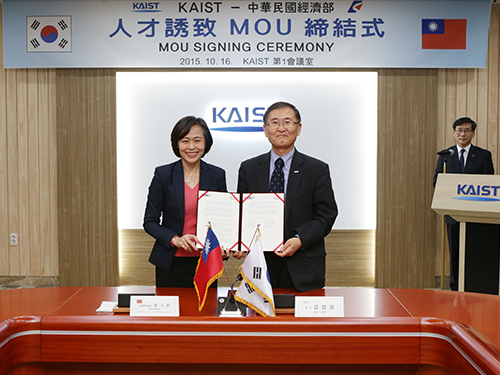 KAIST Agrees to Personnel Exchange with the Ministry of Economic Affairs of the Republic of China
A delegation from the Ministry of Economic Affairs (MOEA) of the Republic of China (ROC) visited KAIST on October 16, 2015.
President Steve Kang of KAIST and Director General Yu-Ping Lien of the Department of Investment Services, MOEA, signed a memorandum of understanding (MOU) on exchanging personnel, recruiting and attracting top talents, and sharing job information.
With the MOU, KAIST and MOEA will develop a mobility program for students in Korea and ROC to help them seek employment opportunities in both nations. Director General Lien hoped that the MOU would bring more of KAIST students in the information technology field to work in ROC.
President Kang responded,
“KAIST has fostered highly talented engineers and researchers across all fields of science and engineering. If these students can have a place in ROC to realize their potential, this certainly could benefit the two nations.”
In the picture from left to right is Director General Yu-Ping Lien of the Department of Investment Services, the Ministry of Economic Affairs of the Republic of China and President Steve Kang of KAIST.
2015.10.17 View 5494
KAIST Agrees to Personnel Exchange with the Ministry of Economic Affairs of the Republic of China
A delegation from the Ministry of Economic Affairs (MOEA) of the Republic of China (ROC) visited KAIST on October 16, 2015.
President Steve Kang of KAIST and Director General Yu-Ping Lien of the Department of Investment Services, MOEA, signed a memorandum of understanding (MOU) on exchanging personnel, recruiting and attracting top talents, and sharing job information.
With the MOU, KAIST and MOEA will develop a mobility program for students in Korea and ROC to help them seek employment opportunities in both nations. Director General Lien hoped that the MOU would bring more of KAIST students in the information technology field to work in ROC.
President Kang responded,
“KAIST has fostered highly talented engineers and researchers across all fields of science and engineering. If these students can have a place in ROC to realize their potential, this certainly could benefit the two nations.”
In the picture from left to right is Director General Yu-Ping Lien of the Department of Investment Services, the Ministry of Economic Affairs of the Republic of China and President Steve Kang of KAIST.
2015.10.17 View 5494 -
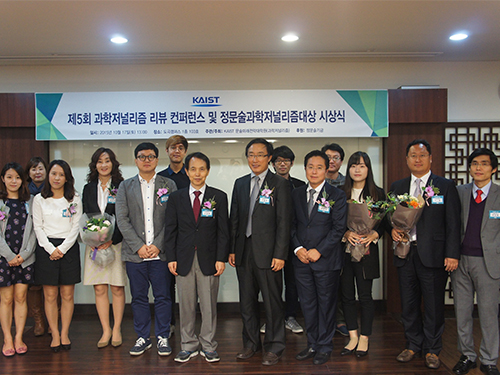 KAIST's Moon Soul Graduate School of Future Strategy Names Recipients of Science Journalism Awards
The Science Journalism Masters Program of the Moon Soul Graduate School of Future Strategy at KAIST named the winners of the 2015 Science Journalism Awards on October 17, 2015. The award ceremony took place at KAIST’s Seoul campus.
The awards were created in 2011 to recognize exemplary journalism that has contributed to the advancement of science and technology in Korea.
This year, the Korean Broadcasting System’s science show called the “Jang Yeong-Sil Show” received the Grand Prize. Yeong-Sil Jang was a Korean scientist and astronomer during the Joseon Dynasty in the 14th century.
A television documentary on challenges facing farm-raised chickens, which was produced by the Munhwa Broadcasting Corporation in Jeonju City, won the TV Award, while news coverage by Dong-A Daily on the outbreak of the Middle East respiratory Syndrome (MERS) in Korea received the Print Award.
After the award ceremony, students and professors of the Science Journalism Program hosted a conference to review and discuss major issues covered by the news media in the past year.
2015.10.15 View 7035
KAIST's Moon Soul Graduate School of Future Strategy Names Recipients of Science Journalism Awards
The Science Journalism Masters Program of the Moon Soul Graduate School of Future Strategy at KAIST named the winners of the 2015 Science Journalism Awards on October 17, 2015. The award ceremony took place at KAIST’s Seoul campus.
The awards were created in 2011 to recognize exemplary journalism that has contributed to the advancement of science and technology in Korea.
This year, the Korean Broadcasting System’s science show called the “Jang Yeong-Sil Show” received the Grand Prize. Yeong-Sil Jang was a Korean scientist and astronomer during the Joseon Dynasty in the 14th century.
A television documentary on challenges facing farm-raised chickens, which was produced by the Munhwa Broadcasting Corporation in Jeonju City, won the TV Award, while news coverage by Dong-A Daily on the outbreak of the Middle East respiratory Syndrome (MERS) in Korea received the Print Award.
After the award ceremony, students and professors of the Science Journalism Program hosted a conference to review and discuss major issues covered by the news media in the past year.
2015.10.15 View 7035 -
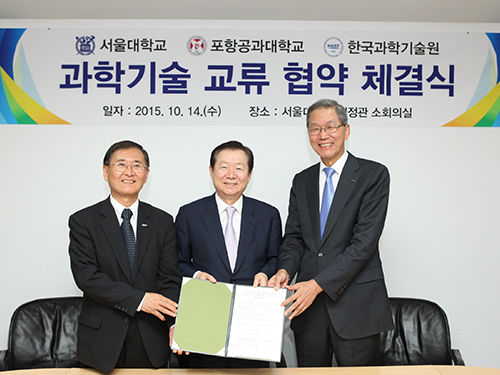 KAIST Teams Up with Korean Universities for MOOCs
KAIST, Seoul National University (SNU), and the Pohang University of Science and Technology (POSTECH) agreed to cooperate in the development of Massive Open Online Courses (MOOCs) for Korean viewers. The agreement ceremony took place at the SNU campus on October 14, 2015.
Under the agreement, professors from all three universities will jointly create and implement online courses on science and engineering by the summer of 2016. The MOOCs will largely consist of basic courses on physics, chemistry, life science, mechanical engineering, and material science. Anyone from a high school student to an adult who is interested in science can take these online courses.
Some of the participating professors will be President Doh-Yeon Kim of POSTECH, Dean Seong-Keun Kim of Natural Sciences College at SNU, Dean Kun-Woo Lee of Engineering College at SNU, Dean Jung-Hoe Kim of Life Science and Bioengineering College at KAIST, Dean Do-Kyung Kim of Academic Affairs at KAIST, Dean Kun-Hong Lee of Engineering College at POSTECH, and Dean Joon-Won Park of Science College at POSTECH.
President Steve Kang of KAIST said,
“Many of Korea’s most distinguished professors in science and engineering will participate in the MOOCs. People, particularly young students aspiring to study science and technology at universities, should definitely take advantage of this opportunity.”
In the picture from left to right is President Steve Kang of KAIST, President Nak-In Sung of Seoul National University, and President Doh-Yeon Kim of Pohang University of Science and Technology.
2015.10.14 View 7824
KAIST Teams Up with Korean Universities for MOOCs
KAIST, Seoul National University (SNU), and the Pohang University of Science and Technology (POSTECH) agreed to cooperate in the development of Massive Open Online Courses (MOOCs) for Korean viewers. The agreement ceremony took place at the SNU campus on October 14, 2015.
Under the agreement, professors from all three universities will jointly create and implement online courses on science and engineering by the summer of 2016. The MOOCs will largely consist of basic courses on physics, chemistry, life science, mechanical engineering, and material science. Anyone from a high school student to an adult who is interested in science can take these online courses.
Some of the participating professors will be President Doh-Yeon Kim of POSTECH, Dean Seong-Keun Kim of Natural Sciences College at SNU, Dean Kun-Woo Lee of Engineering College at SNU, Dean Jung-Hoe Kim of Life Science and Bioengineering College at KAIST, Dean Do-Kyung Kim of Academic Affairs at KAIST, Dean Kun-Hong Lee of Engineering College at POSTECH, and Dean Joon-Won Park of Science College at POSTECH.
President Steve Kang of KAIST said,
“Many of Korea’s most distinguished professors in science and engineering will participate in the MOOCs. People, particularly young students aspiring to study science and technology at universities, should definitely take advantage of this opportunity.”
In the picture from left to right is President Steve Kang of KAIST, President Nak-In Sung of Seoul National University, and President Doh-Yeon Kim of Pohang University of Science and Technology.
2015.10.14 View 7824 -
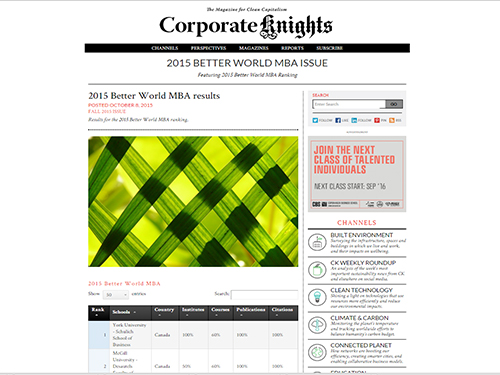 KAIST's College of Business Places Fourth in the 2015 Better World MBA Ranking
The Corporate Knights, a business and society magazine based in Canada, released the results of the 2015 Better World MBA Ranking on October 8, 2015.
KAIST’s business school ranked fourth globally and, number one in Asia, according to the list.
The 2015 Corporate Knights Better World MBA Ranking included a total of 121 schools; York University’s Schulich School of Business of Canada took first place.
The rankings were based on three criteria: the number of curricula (core and required courses) dedicated to sustainability, the number of research institutions and centers at the business school, and the volume of faculty research focused on better world topics such as sustainable finance, clean energy, or gender diversity.
The Better World MBA Ranking aims to identify business schools that best equip graduates who seek to change the world for the better by offering students opportunities to learn how to integrate social and environmental factors in their understanding of management functions via core MBA courses, faculty expertise, and research centers.
Dean Dong-Seok Kim of the College of Business at KAIST said,
“For years, our school has introduced a wide range of programs and research initiatives that address important social needs and issues. As part of this effort, we created the Graduate School of Green Growth and MBA for Social Entrepreneurship back in 2013. I believe that these endeavors played a favorable role in our receiving high scores in the ranking.”
KAIST’s Graduate School of Green Growth previously ranked sixth in the world’s top Green MBA School list published by Corporate Knights.
For the 2015 Better World MBA Ranking, go to
http://www.corporateknights.com/reports/2015-global-sustainable-mba/11153-14442629/.
2015.10.12 View 5435
KAIST's College of Business Places Fourth in the 2015 Better World MBA Ranking
The Corporate Knights, a business and society magazine based in Canada, released the results of the 2015 Better World MBA Ranking on October 8, 2015.
KAIST’s business school ranked fourth globally and, number one in Asia, according to the list.
The 2015 Corporate Knights Better World MBA Ranking included a total of 121 schools; York University’s Schulich School of Business of Canada took first place.
The rankings were based on three criteria: the number of curricula (core and required courses) dedicated to sustainability, the number of research institutions and centers at the business school, and the volume of faculty research focused on better world topics such as sustainable finance, clean energy, or gender diversity.
The Better World MBA Ranking aims to identify business schools that best equip graduates who seek to change the world for the better by offering students opportunities to learn how to integrate social and environmental factors in their understanding of management functions via core MBA courses, faculty expertise, and research centers.
Dean Dong-Seok Kim of the College of Business at KAIST said,
“For years, our school has introduced a wide range of programs and research initiatives that address important social needs and issues. As part of this effort, we created the Graduate School of Green Growth and MBA for Social Entrepreneurship back in 2013. I believe that these endeavors played a favorable role in our receiving high scores in the ranking.”
KAIST’s Graduate School of Green Growth previously ranked sixth in the world’s top Green MBA School list published by Corporate Knights.
For the 2015 Better World MBA Ranking, go to
http://www.corporateknights.com/reports/2015-global-sustainable-mba/11153-14442629/.
2015.10.12 View 5435